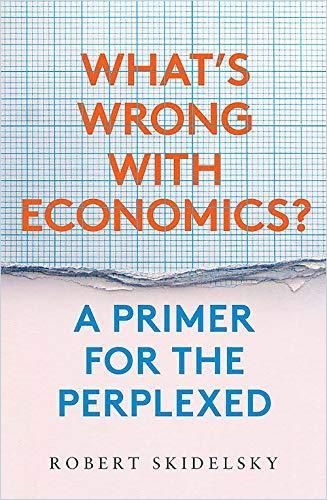Professor Robert Skidelsky details the moral and real-world failures of current economic thinking.

Economics Explained
Historian Robert Skidelsky acknowledges that the field of economics and its practitioners have come in for a great deal of criticism, particularly for not foreseeing the 2008 financial crisis and for prioritizing mathematics while disregarding real-world information. Skidelsky – emeritus professor of political economy at the University of Warwick and author of the definitive biography of John Maynard Keynes – doesn’t pile on, but he does offer a comprehensive, measured and insightful critique of the science, written with subtlety, balance and colorful references. Without complicating the subject, he guides readers to understand economics’ value to society and to question its morals, motives and results.
A Humanity, or a Hard Science?
Compared to other subjects in the humanities, economics relies more on data collection and observation, because money proves an effective measure of motivation. Economists work with models, diagrams and equations that seek to reach objective scientific conclusions.
If economics is much like other social sciences, able to offer qualitative, not quantitative, predictions, the claim that formal modeling is the only way to get at the truths which matter for economic life is a sign of hubris.Robert Skidelsky
Skidelsky admits that scientific and mathematical models can enhance understanding. But he notes that the people who participate in an economy bring self-referential feedback and unpredictable responses into the mix. The hard sciences can repeat experiments with clear controls; complex economies, however, can rarely provide irrefutable proof.
Bold Assumptions
In neoclassical economics, the concept of the rational, utility-maximizing individual plays a role equivalent to that of gravity in physics. For economists, causation runs from persons to institutions or groups, and never the other way around: Only the individual has agency within an economy.
Individualism offers a more efficient basis for modeling than holism or organicism. It is much easier to posit individuals equipped with a single motive – rational self-interest – than work one’s way to a conclusion through the complexity of social relationships.Robert Skidelsky
Starting with the individual may be convenient and efficient, but it is not the most accurate approach, according to the author. Aggregation and generalization provides economics with useful insights, but generalizing from oversimplified premises delivers its biggest flaws.
Theory versus Reality
Assumptions regarding efficient markets and rational expectations allow economists to conclude that competition and incentive produce the optimum amount of goods and services at the best price. The concept of equilibrium – from physics – holds that, despite technological developments or changes in consumer tastes, economic equilibrium returns when market forces settle on the optimum outcome. Economists view markets as self-adjusting and therefore not requiring intervention or improvement. But John Maynard Keynes warned about people’s irrational herd behavior, which affects the calculation of risk.
But today economists normally talk maths to each other, and few bother to talk or listen to anyone else.Robert Skidelsky
Simplifying the messy world into manageable variables requires assumptions and omissions. Data and equations clarify thinking and produce useful generalizations. But Skidelsky highlights that, as economic experts build ever-more elaborate models and make assumptions that blind them to events such as the 2008 crisis, economics’ real value to society proves questionable.
Economists’ health warnings are like the small print in a statement of business accounts which no one reads.Robert Skidelsky
The inferences and simplifications of economic modeling – and even the act of selecting and designing the models – include ideological, moral and political choices. When nothing is black and white, Skidelsky explains, gatekeepers and vested interests exert greater influence on economic policy.
Economic Power
Two early economists of opposing political opinions, Karl Marx and David Ricardo, had one thing in common: They both believed the economy provided a “surplus” that would end up benefiting one class or another, depending on the class’s structural advantages. The study of power was central in their time, as it remains today in political science.
Political science, the science which deals with relations based on power, should be part of the education of every economist, since power structures shape the structure of choice.Robert Skidelsky
Skidelsky points out that models and theories may be neat and convincing, but they encourage economists to disregard issues of economic power, such as, for example, the growing influence of digital platforms in today’s economy. Neoclassical economics idealizes competition, positing that excessive power or profits should not be possible in a truly competitive marketplace. But that construct ends up invalidating any criticism of the power of the modern megacorporation.
Ethics
Most economists regard questions of ethics as being above their pay grade; they focus on efficiency and technicalities, leaving to others the more subjective questions about the societal value of economic activities or goods.
By failing to distinguish between needs and wants, and by taking wants as given, economics has powerfully reinforced the ethical blindness which threatens the human species with extinction. Insatiability in the face of climate change is not rationality, but madness.Robert Skidelsky
Having learned from 18th-century philosopher Adam Smith that the greed of the butcher and baker is generally good for society, economists are slow to let go of this consumption-maximizing stance – their models don’t work without it. But in the face of today’s environmental concerns, the simplistic view of maximizing consumption seems anachronistic. Ignoring income and wealth inequality renders economics even more irrelevant to society.
History
Studying economic history, Skidelsky reminds readers, can temper hubris and groupthink. For example, in the 1990s, economists with a sense of history warned against the ideological “shock therapy” of quick, mass privatizations in Russia, which ended up creating a class of oligarchs.
Economists should approach history in an enquiring, rather than a conquering, frame of mind.Robert Skidelsky
The author believes that the field of economics would benefit from incorporating other social sciences, especially economic history, into teachers’ curricula.
Review
Skidelsky offers nothing less than a detailed analysis of the state of economics. He writes, for the most part, in layperson’s terms and in a calm, measured tone, but often in paragraph-long sentences you may have to read twice. He tempers his explanations with his acute moral sense and profound disappointment in his field regarding its ethics, real-world applications and utility. Skidelsky clarifies economics – and its history – for anyone seeking that knowledge, especially students and other economists.
Robert Skidelsky is also the author of John Maynard Keynes, an award-winning three-part biography; How Much Is Enough?; Money and Government; Work in the Future; and Britain Since 1900.










